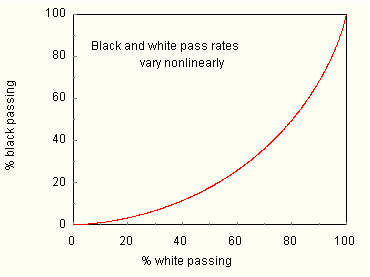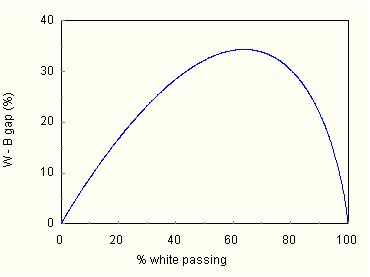Much Ado About Nothing - Gifted Education
Florida policymakers are considering changes to the state's gifted education program that could redefine the smart kid and let more join the club next school year.
The proposal, which effectively lowers IQ standards, has the potential to reshape one of public education's most loved and loathed programs.
Of course the article mentions the typical "experts" who say that IQ doesn't really measure giftedness, but the article also mentions that some experts think that lowering the standards will actually increase the proportion of white students to minority students.
They are right! For a detailed explanation please go to La Griffe Du Lion and read here and here, but let me attempt to sum it up for you.
Basically, due to the distribution and mean IQ scores of different groups, the difference of frequency (percentage of any group scoring any given score) varies in a nonlinear way. See the chart below from La Griffe Du Lion:

Figure 6. Interdependence of group pass rates. Shown here for typical values of black and white distribution parameters.And with this we can now plot the predicted B/W IQ gap relative to any given white pass rate on any given test:
 Figure 7. Predicted black-white point gap vs. white pass rate.
Figure 7. Predicted black-white point gap vs. white pass rate.The predicted gap dependence shown in Figure 7 makes qualitative sense. Suppose an exam is so difficult that very few students pass, both black and white pass rates will be small, and consequently so will their difference. In the high-difficulty limit, the gap vanishes. At the other end, if a test is made so trivial that nearly 100 percent of all students pass, group pass-rate differences must again be small, and go to zero in the low-difficulty limit. Between these extremes the point gap attains a maximum value.
Now we have this chart based on percentiles, all we have to do is to figure out the percentile equivalent of any given IQ score. (Note: the percentile equivalents are not disaggregated for whites but finding disaggregated IQ distribution scores is impossible unless you are willing to pay)
Now we plot the Percent of Whites Making the Cutoff (scoring a given IQ score on a test) on to Figure 7 to get the White-Black gap in percentage points. 
The same thing can also be seen in this chart from the Wikipedia article on Race and intelligence (Average gaps among races)

As you can see, lowering the IQ threshold for the Gifted program in Florida from 130 to 120 will result in an greater ratio of whites to blacks to the program, even though more blacks will qualify. (Some of you might notice that this is basically the same sort of thing that educators do to reduce the achievement gap as measured against state standards. See Charles Murray's article on this here.)
Of course all this arbitrary setting of cutoff points doesn't mean anything in the real world because...
gifted education in most school districts sucks!
That's right, gifted education is for a large part a waste of resources.
Unfortunately, due to the political climate in education, educrats disdain for truly gifted students, and a tendency for educators to provide enrichment instead of acceleration, gifted students get shafted.
In some ways above average students are even more shafted than average students in our country. First of all gifted education usually disappears once students get into middle school, only to be replaced with honors and AP classes. And due to a prejudice against to much acceleration, young students who are probably capable of performing at several grades above the standards aren't given the opportunity. Instead they are saddled with all sorts of enrichment activities that usually involve some multidisciplinary project that emphasizes application of skills... bla, bla, bla.
Sure it appears to outsiders that gifted programs must work since the students are so bright, but they were bright before they got into the gifted program. Just as high SES schools appear to be successful based on the performance of their (mostly upper middle class white) students, gifted programs appear successful for the exact same reasons.
If Florida's law makers ultimate goal is to reduce the achievement gap, increasing the number of minority students in gifted education is not going to do it, but somehow I think its more of a numbers game that a true effort to improve educational opportunities.
Disclaimer: My son is in his 3rd grade gifted program and it sucks!
Note: Even if my logic about lowering the IQ threshold for gifted programs is totally screwed up, gifted programs still suck.

